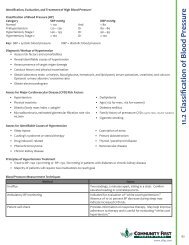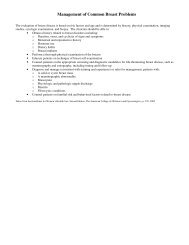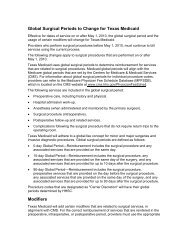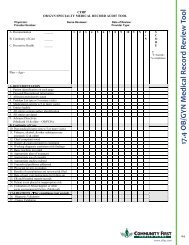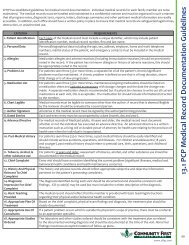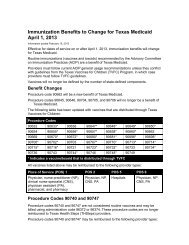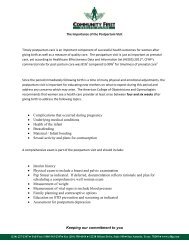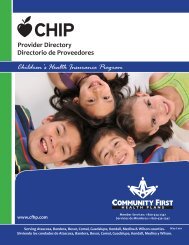Full Clinical Guidelines - Community First Health Plans.
Full Clinical Guidelines - Community First Health Plans.
Full Clinical Guidelines - Community First Health Plans.
You also want an ePaper? Increase the reach of your titles
YUMPU automatically turns print PDFs into web optimized ePapers that Google loves.
According to the Centers for Disease Control, in 2006 more than 351,974 babies (8.3%) are low birth weight (defined as less than<br />
2500 grams or 5.5 pounds), while 59,000 (1.4%) are very low birth weight (defined as less than 1500 grams or 3.3 pounds). More<br />
than 13% are preterm births.<br />
The percentage of women seeking and obtaining prenatal care during the first trimester has increased over the years. Many<br />
high-risk women, however, continue to experience difficulty in accessing early prenatal care. The San Antonio Metropolitan<br />
<strong>Health</strong> District, reports that in 2006, 14% of pregnant women in Bexar County received late or no prenatal care. This is of particular<br />
concern for the pregnant teen, as 6% of all live births in Bexar County in 2003 were to young women under the age of 20.<br />
Access to early prenatal care is a hallmark of quality health care. CFHP Services Staff outreach to 100% of newly enrolled members.<br />
Successful contact has increased from 35% in August 2000 to 65% in August 2008. Barriers to contact across the state include<br />
inaccurate telephone numbers and addresses. <strong>Community</strong> <strong>First</strong> remains committed to continual improvement in outreach efforts<br />
to the prenatal population.<br />
The <strong>Health</strong> Services Staff collaborate with health plan providers to offer comprehensive perinatal services, as we believe<br />
education is an important factor in changing behaviors and improving the overall health of our members. Outreach to pregnant<br />
members includes:<br />
• completion of a prenatal health risk assessment;<br />
• referral to educational or community resources, as needed;<br />
• education regarding the importance of early prenatal care;<br />
• assignment of a pediatrician prior to birth and newborn check-ups; and<br />
• education regarding the importance of the 6 week postpartum visit.<br />
CFHP is committed to addressing these issues at large, through our <strong>Health</strong>y Expectations prenatal program, because of the<br />
opportunity for a “win-win” situation. <strong>Health</strong> outcomes can be improved, at the same time that the high costs of perinatal care<br />
can be reduced. The <strong>Health</strong>y Expectations program utilizes two phases to outreach and educate prenatal members.<br />
An assessment program for identified pregnant women provides an opportunity to identify risk factors. Social and behavioral<br />
health education and referral are typical outcome strategies at the initial assessment phase. When completed, the risk tool<br />
allows clinical staff time to outreach to those at increased risk for complications. Those at lower risk are sent educational<br />
materials by mail and encouraged to attend community sponsored prenatal education classes. Pregnant members are routinely<br />
reassessed at 20-24 weeks gestation, to evaluate for changes in prenatal health.<br />
Prenatal Assessment and Education Program<br />
A high-risk component to the prenatal program allows clinical staff an avenue for conducting ongoing education and outreach<br />
to women at a higher risk for adverse pregnancy outcomes. This component of the program was initiated in November 1999,<br />
and is intended to provide education and assistance to our members who are at risk for experiencing pregnancy complications,<br />
especially premature labor. Registered nurses, who have specialized and have clinical experience in obstetric care nursing,<br />
provide education and assistance in coordination of necessary services.<br />
The phases of the <strong>Health</strong>y Expectations prenatal program provide numerous opportunities to assess member health, pregnancy<br />
status, to promote compliance with appropriate perinatal guidelines, and provide member education. Programs such as our<br />
<strong>Health</strong>y Expectations have been recognized by the American Association of <strong>Health</strong> <strong>Plans</strong> as best practices in case management for<br />
prenatal care. Academic research and experience by other health plans have demonstrated a decrease in the costs of newborn<br />
care, mostly due to the prevention of premature births.<br />
H EALTH PLANS<br />
www.cfhp.com<br />
163



